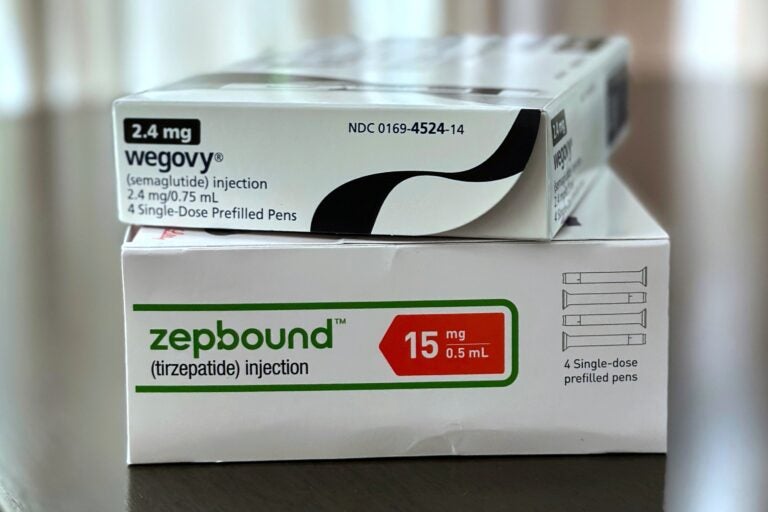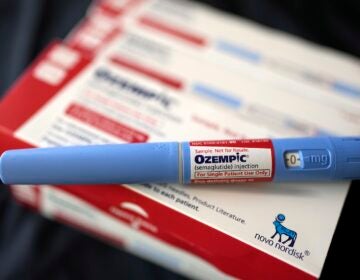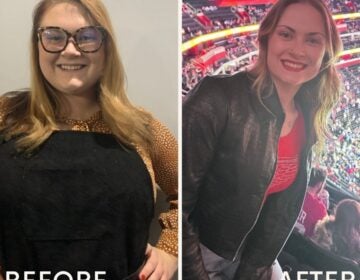Pa. and N.J. poison control centers see steep rise in exposure calls tied to popular weight-loss drugs
Poison control experts say calls related to GLP-1 weight-loss drugs like Wegovy and Zepbound are rising, with symptoms like nausea, vomiting and abdominal pain.
Listen 1:23
FILE - Boxes for the medications Wegovy and Zepbound are arranged for a photograph on May 8, 2025. (AP Photo/JoNel Aleccia, file)
From Philly and the Pa. suburbs to South Jersey and Delaware, what would you like WHYY News to cover? Let us know!
Ever since blockbuster weight-loss drugs like Wegovy and Zepbound went mainstream, calls to local poison control centers about side effects, incorrect dosing and other types of exposure are on a steep rise.
Poison control experts in Philadelphia and New Jersey say it’s a trend they’re closely monitoring, especially as counterfeit products become a growing concern.
“These drugs have a very important role to play in health care,” said Bruce Ruck, managing director of the New Jersey Poison Control Center at Rutgers New Jersey Medical School. “I think we just have to follow them to make sure the long-term benefits continue to be maintained, that we don’t notice any unforeseen consequences 10 years down the line.”
Glucagon-like peptide-1 agonists are a class of medications historically used to treat type 2 diabetes and manage blood sugar. In recent years, some of these drugs have also been approved to treat obesity and for weight loss.
Their popularity in Hollywood and among public figures has led to a rapid surge in demand for the drugs.
That makes the rise in calls to poison control centers for GLP-1 exposure unsurprising, but no less concerning, said Anthony Jaworski, clinical program manager of the Poison Control Center at Children’s Hospital of Philadelphia.
“Whenever you increase the amount of usage of something or have more of something in the household or you’re just taking more medications that may be new to you, we’re definitely going to get more calls that relate to accidents or overdoses,” he said.
Cases of weight-loss drug poisoning
In 2021, the New Jersey Poison Control Center recorded 29 GLP-1 exposure cases. By 2024, that number jumped to 189.
The Poison Control Center at CHOP saw 95 related cases in 2023. In just a single year, the number nearly doubled to 192. As of this month, there’s already been 126 exposures so far this year.
The local increases reflect what is happening on a national level, with GLP-1 exposure ballooning from 1,090 cases in 2020 to 8,501 cases in 2024, according to figures from the National Poison Data System at America’s Poison Centers.
GLP-1 exposure cases include calls made by people with a suspected poisoning or by people who are experiencing any side effect or symptom after taking the wrong dosage of a medication, or even when they are taking it as prescribed.
“Then they have that unexpected nausea, vomiting, symptoms, diarrhea sometimes, and they call us to see, ‘Hey, is this something that we really need to be concerned about? Do we need to stop it?’” Jaworski said.
Experts note that although they are seeing a sharp rise in exposures, the severity of cases and poisonings has not changed over time and are not worse compared to past GLP-1 exposures.
After consulting experts at poison control centers, Jaworski and Ruck said most people are able to avoid an emergency room visit and monitor symptoms at home. In rare cases, people do go to the hospital.
However, Jaworski said his team has noticed some other concerning trends, including how people are buying compounded or counterfeit GLP-1 drugs from online marketplaces and through social media.
“Some of them may contain stuff that they don’t even know is in there,” he said. “Then there have been reports of people getting seriously ill.”
Jaworski said they’re also getting calls from people who are taking medication that was originally prescribed to a family member or friend. Taking another person’s medication can put someone at risk for unexpected side effects and health complications, he said.
Unregulated compounds and dosing mistakes
Compounded GLP-1 drugs prescribed during previous shortages continue to be another issue, Jaworski said. Even if they came from a licensed pharmacy, these mixtures are often not approved for safety and effectiveness by federal agencies like the Food and Drug Administration.
These compounded medications can come in vials that require a person to measure and draw their own dosages in a syringe rather than use pre-filled auto-injector pens that many of the name-brand medications come in. This can lead to dosing mistakes, Jaworski said.
Most of these cases concern adults, Ruck said, and accidental injections among kids and teens are outliers. But as these medications become more common in households, especially if they come in pill forms, he said people need to be careful around kids.
“We have to remind people that even though these are injectables, keep them locked away,” Ruck said. “Some of them have to be refrigerated. We want to make sure they’re not in easy reach of a child or where a child can get to them.”
As time goes on, Ruck said calls to poison control centers about GLP-1 exposure and concerns may decline as people become more familiar with common side effects and hospital staff learn to treat more cases.
But he said poison control centers are constantly doing surveillance and looking out for any side effects and other signs that may point to possible manufacturing errors, label mistakes or new ways in which medications are being misused.
“It’s important to get these individual side effects reported to us, especially for new drugs, so that we can trend it,” Ruck said.
Experts recommend that people carefully follow medication dosages as prescribed, get proper education on how to fill syringes and never buy or use GLP-1 drugs from unregulated, online marketplaces or family and friends.
If you suspect a poisoning, call the national poison control helpline at 1-800-222-1222 to be connected with experts at the nearest regional center.

Get daily updates from WHYY News!
WHYY is your source for fact-based, in-depth journalism and information. As a nonprofit organization, we rely on financial support from readers like you. Please give today.




